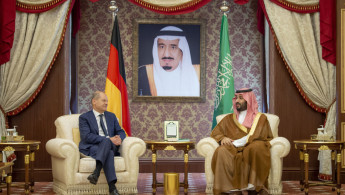Germany to 'sell arms to Saudi Arabia' despite arms export ban 'due to crushing energy crisis'
Saudi Arabia could obtain German weapons despite a 2018 arms ban being in place on Riyadh, as Berlin's new leader looks to mitigate the country's devastating energy crisis, according to reports.
The weapons deal will include $34 million in weapons and equipment for Eurofighter and Tornado fighter jets, according to Der Spiegel, after Chancellor Olaf Scholz visited Saudi Arabia and the UAE earlier this month.
Another smaller sale will see spare parts for Airbus A330s being supplied to Riyadh, as part of a European cooperation agreement.
The weapons will be sold as part of a pan-European project with Italy, Spain, and the UK, according to a letter by Economy Minister Robert Habeck to parliament's economy committee.
The previous government did allow for some weapons to be supplied to the Gulf state via European partners.
Germany placed a ban on weapons sales to Riyadh in 2018 after the murder of Saudi journalist Jamal Khashoggi at the kingdom's consulate in Istanbul and owing to the bloody war in Yemen.
It is the first weapons sale to Saudi Arabia agreed upon by the new coalition government, which includes the centre-left Social Democrats, the Greens and pro-business Free Democrats.
The opposition The Left party has slammed the deal as "criminal".
Despite initial anger over the killing of Khashoggi by government officials, many Western countries have softened their tone on the Gulf state.
This was seen when Scholz met Saudi Crown Prince Mohammed bin Salman in Riyadh earlier this week, a figure linked to the murder, according to Turkey and US intelligencee.
The Saudi-led offensive on Yemen has cost thousands of lives and a devastating siege contributed to many more through starvation and disease.
Fighting has sharply decreased in Yemen after extensions of April's ceasefire agreement.
Chancellor Scholz visited energy-rich Gulf states this month, after his country's gas supplies were crippled by the Russian invasion of Ukraine in February.
Russia was one of Germany's biggest gas providers, before US pressure and Moscow's energy games forced Berlin to find new partners.






![22 Arab countries at COP29 have rejected the targeting of fossil fuels [Getty]](/sites/default/files/styles/image_330x185/public/2024-11/GettyImages-2184289638.jpg?h=199d8c1f&itok=ptHl5bec)
![Dozens of people turned out for the funerals [Getty]](/sites/default/files/styles/image_330x185/public/2024-11/GettyImages-2185229760.jpg?h=e7c891e8&itok=1bctDcE6)